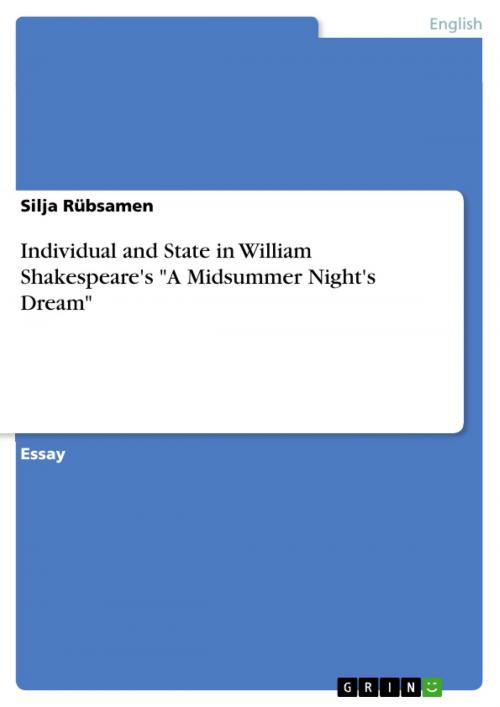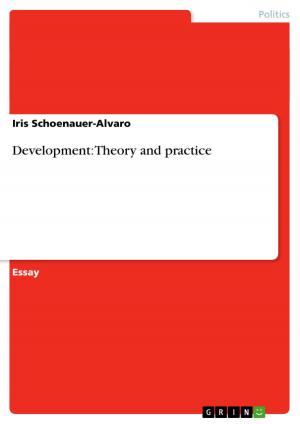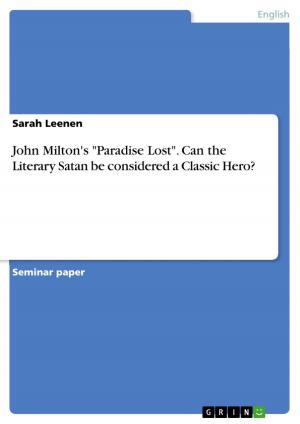Individual and State in William Shakespeare's 'A Midsummer Night's Dream'
Fiction & Literature, Literary Theory & Criticism, British| Author: | Silja Rübsamen | ISBN: | 9783638507400 |
| Publisher: | GRIN Publishing | Publication: | June 2, 2006 |
| Imprint: | GRIN Publishing | Language: | English |
| Author: | Silja Rübsamen |
| ISBN: | 9783638507400 |
| Publisher: | GRIN Publishing |
| Publication: | June 2, 2006 |
| Imprint: | GRIN Publishing |
| Language: | English |
Essay from the year 2002 in the subject English Language and Literature Studies - Literature, grade: A, University of Massachusetts - Amherst (English Department), course: English 732 - Shakespeare, 0 entries in the bibliography, language: English, abstract: 'A Midsummer Night´s Dream and The Tempest, a play it prefigures in important ways, share the distinction of illustrating better than any other plays Shakespeare´s device of juxtaposing extremes for the purpose of indicating a golden mean.' Peter G. Philias remarks that Shakespeare's Midsummer Night's Dream is a play that lives of seemingly incompatible contradictions: civilization and nature are juxtaposed in the confrontation of the court of Athens and the woods; man and woman are working against each other in the unequal parts of Theseus and Hippolyta, Oberon and Titania, and arch-conservative Egeus and his daughter Hermia. It seems consensual to state that - on the deep structure level - the contradiction between 'doting', the fixation of a lover on a partner who does not return the affections, and 'cool reason' forms the common ground of these and several other antagonisms. But although I consent to this view, I would also like to deny the reduction of this play to a mere love story - a view expressed by Philias, who claims that had been Shakespeare's intention 'to comopse a play presenting sudden conflict between lovers as well as antithetical attitudes toward love.' I am convinced that the contents of A Midsummer Night's Dream go far beyond the topics of family conflict or interpersonal relationship. The basic conflict between reason and emotion can only become the departing point of the story because it triggers an underlying conflict between individual and society, respectively between individual and state. 'Every Shakespearean character lives within a political regime governed laws and shaped by distinctive institutions. How a character lives acts and how he perceives his deeds is affected, sometimes crucially affected, by his participation in the corporate life of a city or realm.' The aim of this paper is to demonstrate where the conflict lies between the individual and the state, respectively its institutions and the officials who represent them, and how it is solved so that the final scenes can indeed be regarded as the establishment of an ideal state of affairs - ideal in the sense of what Philias calls the 'golden means'.
Essay from the year 2002 in the subject English Language and Literature Studies - Literature, grade: A, University of Massachusetts - Amherst (English Department), course: English 732 - Shakespeare, 0 entries in the bibliography, language: English, abstract: 'A Midsummer Night´s Dream and The Tempest, a play it prefigures in important ways, share the distinction of illustrating better than any other plays Shakespeare´s device of juxtaposing extremes for the purpose of indicating a golden mean.' Peter G. Philias remarks that Shakespeare's Midsummer Night's Dream is a play that lives of seemingly incompatible contradictions: civilization and nature are juxtaposed in the confrontation of the court of Athens and the woods; man and woman are working against each other in the unequal parts of Theseus and Hippolyta, Oberon and Titania, and arch-conservative Egeus and his daughter Hermia. It seems consensual to state that - on the deep structure level - the contradiction between 'doting', the fixation of a lover on a partner who does not return the affections, and 'cool reason' forms the common ground of these and several other antagonisms. But although I consent to this view, I would also like to deny the reduction of this play to a mere love story - a view expressed by Philias, who claims that had been Shakespeare's intention 'to comopse a play presenting sudden conflict between lovers as well as antithetical attitudes toward love.' I am convinced that the contents of A Midsummer Night's Dream go far beyond the topics of family conflict or interpersonal relationship. The basic conflict between reason and emotion can only become the departing point of the story because it triggers an underlying conflict between individual and society, respectively between individual and state. 'Every Shakespearean character lives within a political regime governed laws and shaped by distinctive institutions. How a character lives acts and how he perceives his deeds is affected, sometimes crucially affected, by his participation in the corporate life of a city or realm.' The aim of this paper is to demonstrate where the conflict lies between the individual and the state, respectively its institutions and the officials who represent them, and how it is solved so that the final scenes can indeed be regarded as the establishment of an ideal state of affairs - ideal in the sense of what Philias calls the 'golden means'.















